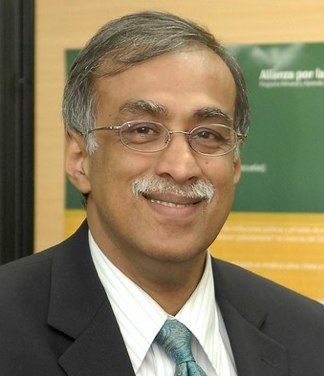Can Microsoft count social good among its top products?
It’s a hard question to answer (for starters, defining and measuring social good is tough) but a fair question to ask in the context of Microsoft’s employee culture of social involvement.
Last year, employee giving and company matched funds totaled nearly $90 million. Volunteer time is matched at $17 per hour; employees can earn up to $12,000 in matched funds from Microsoft every year. There’s also a growing tradition of social enterprise among Microsoft employees and alumni. Former employees have founded and offered leadership support to more than 150 nonprofit organizations and social ventures, while a crop of current employees balance work with running their own nonprofits, among them Givology, Jolkona and CRY America.
 How much of a hand does Microsoft have in influencing this culture of social participation? My assumption was, a lot. But when I spoke with Akhtar Badshah, Microsoft’s Senior Director of Community Affairs, he painted a more nuanced picture.
How much of a hand does Microsoft have in influencing this culture of social participation? My assumption was, a lot. But when I spoke with Akhtar Badshah, Microsoft’s Senior Director of Community Affairs, he painted a more nuanced picture.
Microsoft nurtures a culture and creates incentives that encourage employee giving and volunteering, but the process is organic, says Akhtar. “We provide the framework [Microsoft runs a large database of activities and opportunities that all employees can access] and employees decide how they want to engage.” The $17 per hour match motivates employees to come back and report their work, which Akhtar and his team can then track.
Each October, when Microsoft runs its employee giving campaign, staff and organizations canvas for support on campus. Competitions, speakers and auctions help to engage employees in new organizations and spur donations, but it’s primarily employee-run. Microsoft provides access, incentives and encouragement, and employees leverage this as they want.
When I admitted that the organic nature of this program countered my perception of Microsoft as a supremely structured company, Akhtar said that the type of structure depends on a company’s overarching culture. It works for Microsoft because “we have role models here. We create an atmosphere where people feel they can do this type of thing and make a difference.”
Akhtar shared the following strategies that companies (perhaps with fewer resources) can apply:
- Match your work to your DNA. For Microsoft, it’s using technology to bring about social change.
- Start small and focus on one thing. “There’s nothing like success to help drive you.”
- Look for ways to affect genuine change in the community, but do it with your core competencies.
You can read more from Akhtar on Microsoft’s Unlimited Potential blog and follow him on Twitter at @akhtarbad.





 I'm Olivia Khalili. I created Cause Capitalism to show you how to grow your business by incorporating a social mission.
I'm Olivia Khalili. I created Cause Capitalism to show you how to grow your business by incorporating a social mission. 

I encourage Akhtar & team to consider promoting employees to use http://www.socialvest.us for holiday gift giving. It’s easy, free & on every purchase you earn money to give back to ANY charity of your choice. It will only layer goodness to all the other good Microsoft is doing.
As the founding Executive Director of the Microsoft Alumni Foundation, I can, with authority, echo Mr. Badshah’s comments. We researched nonprofits founded by alumni and found over 150 giving over $100M net annually in over 100 countries around the world. It was jaw-dropping when we realized the that we were just looking at the tip of the iceberg when it comes to impact. (Details of the impact statement can be found at the Microsoft Alumni Foundation website, http://www.microsoftalumni.org).
I did want to expand on Mr. Badshah’s comments by adding that, like most organizations, culture is set by the tone at the top, and Bill and Melinda Gates, and Paul Allen have set that bar high. Many of the alumni I met during my nearly three-year tenure at MSAF cited Bill’s inspirational example of giving as part of their reason for giving back.
Mr. Badshah has an extraordinary team that works incredibly hard to guide the Community Affairs program, so I hope he’ll forgive me for saying he’s very humble, I know few people who work so hard to help others. It is organic–yes, but it doesn’t happen by chance.
Anne, many thanks for adding so much to the conversation. I wish I’d known the specific impacts of these alumni organizations. I figured it was quite large.
I love your last comment as well about Akhtar and his team. He was quite humble; perhaps I need to interview someone else to learn more about his work!
Thanks again,
Olivia
Anne: Thank you very much for the kind words. As you very well know the work MS employees and Alumni do investing in society speaks volume in terms of the values of this compnay. As much as Bill, Melinda and Paul have been role models and continue to be so, I also beleive that for many employees it is the other employeees that are becoming role models for how we can give back and do so in unique and innovative ways. Thanks